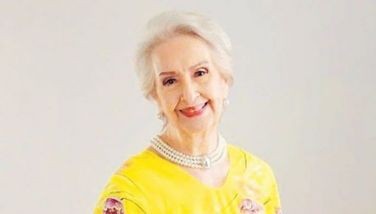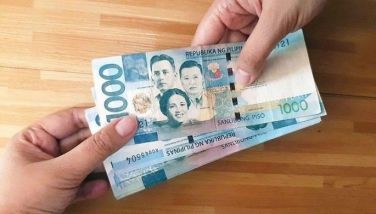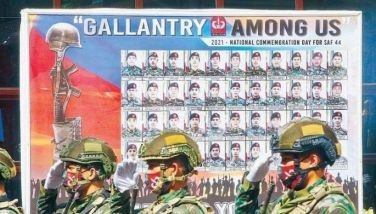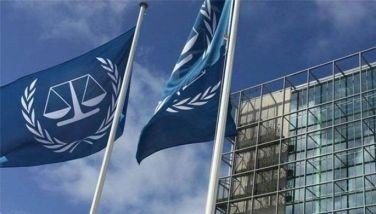Lack of senior officers snags AFP revamp
January 14, 2006 | 12:00am
The Armed Forces of the Philippines (AFP) will face a manpower crisis, at least among its senior brass, with the impending retirement of 54 senior officers this year.
This is one of the reasons why Maj. Gen. Gabriel Habacon was reportedly pulled out as commander of the Army’s 1st Infantry "Tabak" Division to head the Southern Command (Southcom), AFP deputy chief of staff Lt. Gen. Samuel Bagasin said yesterday.
"You see, for year 2006 we will be having about 52 or 54 retirements of general-officers," Bagasin pointed out.
Habacon has been appointed as Southcom chief, a position usually reserved for three-star generals to lead the military’s largest troop contingent outside of Metro Manila.
Habacon’s promotion to Southcom effectively caused upward movement of other officers occupying positions in the lower command echelon, Bagasin added.
At present the AFP has 134 generals, including AFP chief Gen. Generoso Senga.
Out of these 134 generals, 11 are three-star or lieutenant generals, 34 are major generals and 88 are brigadier generals.
However most — if not all — of the three-star and two-star officers are holding key military positions and are scheduled to retire this year.
Allowing these retirement-age officers to hold on to their present positions would not be practical since it would effectively block lower-ranking officers from moving up the promotion ladder, Bagasin noted.
Bagasin said he is among the 54 senior officers scheduled for retirement this year. He was appointed to head the Central Command (Cencom) replacing Lt. Gen. Emmanuel Teodosio who is retiring on Jan. 21.
"So we noticed an acceleration of retirees for the year... If we get people who are the most senior and appoint them in the positions that may later become vacant because they will be retiring, we will end up being short of senior officers to fill up the posts," Bagasin explained.
This explains why, according to Bagasin, the AFP had to appoint officers who had less than a year remaining in service, if only to facilitate the necessary transitions.
Bagasin claimed that by the time all 54 senior officers — including himself — have retired from the service, those who would be taking their places will have gone through the necessary steps.
"(This is the) ideal transition (period for) officers assuming positions in unified commands," he said.
Bagasin said Habacon is the most qualified to lead Southcom in the absence of other division commanders.
This was also the apparent reason why Defense Secretary Avelino Cruz approved the AFP’s recommendation to move Habacon to Southcom and appointed himself to head Cencom, Bagasin said.
Bagasin noted critics had slammed Habacon’s appointment as well as the promotion of AFP deputy chief for intelligence Rear Admiral Tirso Danga as Western Command (Wescom) chief.
Malacañang and the AFP top brass jointly defended the appointments of Habacon and Danga amid criticisms linking them to the "Hello, Garci" wiretap scandal.
This is one of the reasons why Maj. Gen. Gabriel Habacon was reportedly pulled out as commander of the Army’s 1st Infantry "Tabak" Division to head the Southern Command (Southcom), AFP deputy chief of staff Lt. Gen. Samuel Bagasin said yesterday.
"You see, for year 2006 we will be having about 52 or 54 retirements of general-officers," Bagasin pointed out.
Habacon has been appointed as Southcom chief, a position usually reserved for three-star generals to lead the military’s largest troop contingent outside of Metro Manila.
Habacon’s promotion to Southcom effectively caused upward movement of other officers occupying positions in the lower command echelon, Bagasin added.
At present the AFP has 134 generals, including AFP chief Gen. Generoso Senga.
Out of these 134 generals, 11 are three-star or lieutenant generals, 34 are major generals and 88 are brigadier generals.
However most — if not all — of the three-star and two-star officers are holding key military positions and are scheduled to retire this year.
Allowing these retirement-age officers to hold on to their present positions would not be practical since it would effectively block lower-ranking officers from moving up the promotion ladder, Bagasin noted.
Bagasin said he is among the 54 senior officers scheduled for retirement this year. He was appointed to head the Central Command (Cencom) replacing Lt. Gen. Emmanuel Teodosio who is retiring on Jan. 21.
"So we noticed an acceleration of retirees for the year... If we get people who are the most senior and appoint them in the positions that may later become vacant because they will be retiring, we will end up being short of senior officers to fill up the posts," Bagasin explained.
This explains why, according to Bagasin, the AFP had to appoint officers who had less than a year remaining in service, if only to facilitate the necessary transitions.
Bagasin claimed that by the time all 54 senior officers — including himself — have retired from the service, those who would be taking their places will have gone through the necessary steps.
"(This is the) ideal transition (period for) officers assuming positions in unified commands," he said.
Bagasin said Habacon is the most qualified to lead Southcom in the absence of other division commanders.
This was also the apparent reason why Defense Secretary Avelino Cruz approved the AFP’s recommendation to move Habacon to Southcom and appointed himself to head Cencom, Bagasin said.
Bagasin noted critics had slammed Habacon’s appointment as well as the promotion of AFP deputy chief for intelligence Rear Admiral Tirso Danga as Western Command (Wescom) chief.
Malacañang and the AFP top brass jointly defended the appointments of Habacon and Danga amid criticisms linking them to the "Hello, Garci" wiretap scandal.
BrandSpace Articles
<
>
- Latest
- Trending
Trending
Latest
Trending
Latest
Recommended






























